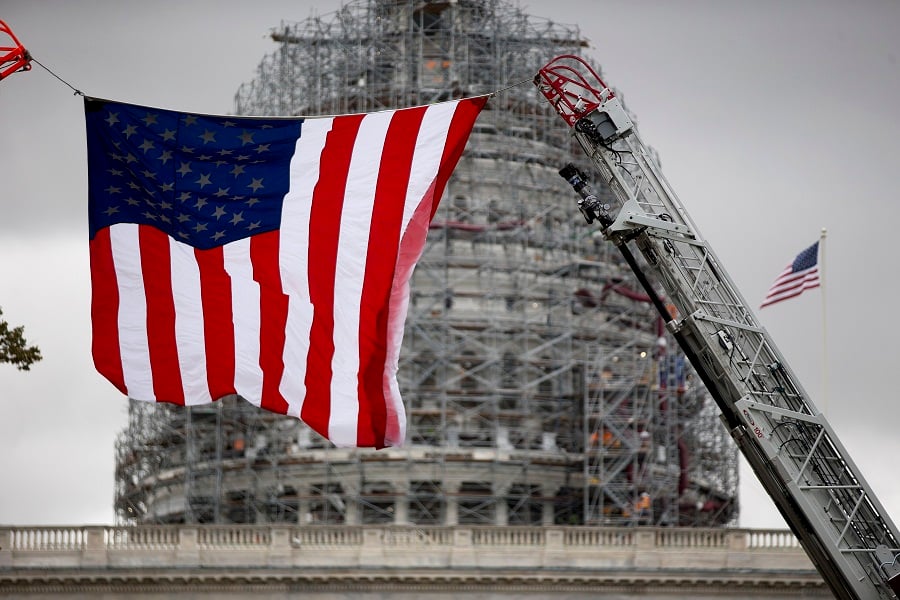Funding set until Dec. 11 but before then, lawmakers have to replenish federal highway funding and raise the debt limit.
Congress passed a stopgap U.S. government spending bill hours before a shutdown deadline Wednesday, a temporary win that provides no road map for how deeply divided lawmakers will handle their next must-do priorities.
The 277-151 House vote, after Senate passage earlier in the day, sends the measure to President Barack Obama before current funding was due to expire at midnight. Democrats helped House Republicans quash an effort by conservative Republicans to remove funding for Planned Parenthood from the bill, after the conservatives' rebellion helped push Speaker John Boehner to announce he'll resign at the end of October.
"We all know that shutting down government is always a mistake," Republican Representative Tom Cole of Oklahoma said during floor debate. "It's simply the wrong thing to do for the American people. They sent us here to get things done."
The spending measure provides only a temporary solution by funding the government through Dec. 11, giving conservatives another opportunity to try to defund Planned Parenthood, the women's reproductive health-care service. Before then, Congress also must replenish federal highway funding and raise the debt limit.
Earlier, Senate Minority Leader Harry Reid, a Nevada Democrat, said, “Republicans brought us dangerously close to a shutdown,” as his chamber passed the spending measure 78-20.
'TOPLINE LIMIT'
At the same time, Senate Majority Leader Mitch McConnell said he and Mr. Boehner plan to begin discussions with Mr. Obama soon on a “topline” government spending limit for the next two fiscal years.
Mr. Obama spoke to Mr. Boehner and Mr. McConnell on Sept. 17 at the two leaders' request, and reiterated his call for congressional Republicans to sit down with Democrats to work out a budget, an administration official said. The administration's goals for a spending deal include longstanding requests: Ending spending caps, raising the debt ceiling and renewing the authorization for the U.S. Export-Import Bank.
The official, who requested anonymity to discuss internal deliberations, didn't say whether the administration was seeking to reach a two-year budget deal with Republican leaders. White House Press Secretary Josh Earnest has repeatedly said it's up to Democrats and Republicans to determine the parameters of a long-term spending plan.
Mr. Earnest told reporters Wednesday that the administration is seeking “conversations that prevent a government shutdown, and conversations that ensure that our national security and economic priorities are adequately funded.” He added, “Republicans have not succeeded and will not succeed in passing budget legislation strictly along party lines.”
DEFUNDING PLANNED PARENTHOOD
On the stopgap spending measure, Mr. McConnell and Mr. Boehner had said that although they too want to cancel federal funds for Planned Parenthood, they wouldn't go along with conservative Republicans' willingness to shut down the government over the issue.
Conservatives have said they are outraged by undercover videos purporting to show Planned Parenthood officials discussing reimbursement for providing tissue from aborted fetuses to researchers. The organization, which receives Medicare funds to provide reproductive health care to women, has said it doesn't sell fetal tissue for profit, and instead receives the cost of collecting and delivering it.
The spending bill, H.R. 719, gives the Obama administration much of what it asked for. It would provide funding at an annual rate of $1.017 trillion, including an extra $700 million for fighting wildfires, more than the White House request of $450 million. The bill would set war funding at an annualized rate of $74.7 billion, more than the $58 billion Mr. Obama sought.
HIGHWAY FUND
With government funding settled for the next few months, Congress has another big item to resolve before Mr. Boehner leaves: how to provide new money for the federal highway fund. Congress has passed 34 stopgap highway funding bills in the last six years, and the most recent one is due to run out Oct. 29.
The 18.4 cents-a-gallon federal gasoline tax that the Highway Trust Fund has relied on no longer covers the cost of the transportation program as Americans drive less and buy more fuel-efficient cars. Republicans have refused to consider raising the tax.
Congress will be asked to raise the debt limit, perhaps in November. Treasury Secretary Jacob Lew has said measures used by the Treasury Department to hold off default would last at least through late October and probably longer. Mr. Boehner had to rely on Democratic votes to get a previous debt limit increase approved.
And in December, a new government shutdown threat could arise if conservatives again try to attach language defunding Planned Parenthood to the next government funding measure.







